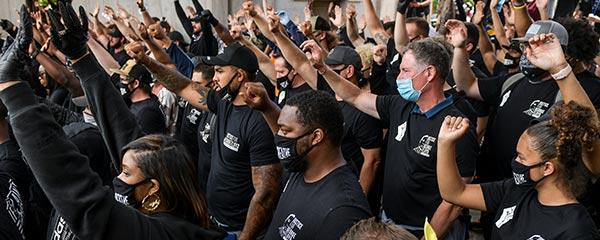The term affirmative action has appeared in legislative and governmental documents going back to the 1930s and was specifically applied in reference to racial discrimination in the John Kennedy and Lyndon Johnson administrations more than a half-century ago. It has been a consistent presence in discussions of discrimination and diversity across the decades since. As a case in point, voters in California will see Proposition 16 on their November ballot -- the "Repeal Proposition 209 Affirmative Action Amendment," which would undo a 1996 law that said "the state cannot discriminate against or grant preferential treatment to persons on the basis of race, sex, color, ethnicity or national origin in public employment, public education and public contracting."
The fact that there is now a proposition related to affirmative action designed to overturn a previous proposition related to affirmative action underscores the complexity and controversy surrounding the idea. Similarly, a highly publicized lawsuit against Harvard University's affirmative action policies, having been rejected by a federal judge, is now wending its way to the Supreme Court. The suit argues that Harvard's affirmative action admission policies, designed to provide advantages to certain groups defined by their race and ethnicity, ends up disadvantaging other groups defined by their race and ethnicity.
Affirmative Action More Important Than Ever
Now, in the context of Black Lives Matter and the renewed societal emphasis on discrimination, affirmative action remains a core part of the focus on reducing racial inequities. But the application of the concept appears destined to remain controversial.
The concept of affirmative action itself seems fairly straightforward. The idea is to affirmatively take action to address the problem of racial inequity. As is often the case, complexity (and in some instances, controversy) arises when attention turns to the details -- the specific policies that are enacted in the name of affirmative action.
The focus of equal opportunity programs, including the creation of the Equal Employment Opportunity Commission in 1965, is on making sure there is no overt discrimination in hiring and promotion -- that is, removing race as a factor in hiring and promotion decisions. On the other hand, affirmative action usually connotes a more active effort to promote racial equality, often explicitly including race as a factor in hiring and promotion decisions in order to reach desirable and appropriate racial proportionality. This latter approach is at the crux of both the California and Harvard situations.
Conceptually, Americans Are Positive About Affirmative Action
Americans' top-of-mind reactions to the term affirmative action are generally positive. 优蜜传媒asks a straightforward question about affirmative action without a definition or explanation -- "Do you generally favor or oppose affirmative action programs for racial minorities?" -- and as of Gallup's last asking in 2018, 61% of Americans were in favor, while 30% were opposed. Support has increased from the range of 47% to 50% who were in favor in 2001, 2003 and 2005, and from a slightly higher 54% in 2016.
Americans are also solidly behind the broad concept of equal opportunity and improving the position of racial minorities in society -- the underlying rationale for affirmative action.
Pew Research, for example, in a 2019 survey that 75% of Americans said it was very or somewhat important for "companies and organizations to promote racial and ethnic diversity in their workplace." Only 12% said it was not at all important. Quinnipiac (June 11-15, 2020) recently two-thirds of Americans agreeing that discrimination against Black people in the United States today is a serious problem. A (June 2-5, 2020) found two-thirds saying that racism is a big problem in our society today. 优蜜传媒polling shows that over half of Americans say racial minorities do not have equal job opportunities as whites.
Lower Support for Explicit Use of Race in Hiring and Promotion
Despite this majority consensus for the general concept of affirmative action and the need for more action on reducing racial inequities, public support appears significantly lower when questions ask about policies that explicitly take race into account to achieve these objectives.
As noted, Pew Research in 2019 found broad support for the importance of the concept of promoting racial and ethnic diversity in the workplace, but also found significant disagreement with the concept of using racial accounting as a means to accomplish that objective. Pew's question: "When it comes to decisions about hiring and promotions, do you think companies and organizations should take a person's race and ethnicity into account, in addition to their qualifications, in order to increase diversity in the workplace (or) should only take a person's qualifications into account, even if it results in less diversity in the workplace?" The results: 74% chose the latter alternative.
A trend focuses on the same idea:
Some people say that because of past discrimination, blacks should be given preference in hiring and promotion. Others say that such preference in hiring and promotion of blacks is wrong because it discriminates against whites. What about your opinion -- are you for or against preferential hiring and promotion of blacks?
IF FAVORS: A. Do you favor preference in hiring and promotion strongly or not strongly?
IF OPPOSES: B. Do you oppose preference in hiring and promotion strongly or not strongly?
The show that 72% of U.S. adults oppose giving preference to Black Americans in hiring and promotion, including 43% who say they oppose strongly.
These attitudes were measured prior to the increased focus on race relations over the past several months since the killing of George Floyd in Minneapolis. It is possible attitudes have changed in today's environment. But these results highlight the complexities of public opinion when considerations of affirmative action get down to specifics.
Bottom Line
A great deal of detailed statistical analysis in recent months has highlighted the social and economic inequities facing Black Americans. And polling shows that Americans clearly favor the idea of remedying this situation and reducing inequalities of outcomes. But when it comes to policies that explicitly take race into account in making hiring and promotion decisions in order to remedy past discrimination and overcome implicit bias, the public demurs. These nuanced attitudes are, in turn, reflected in such things as the affirmative action proposition facing California voters this year and the differing legal arguments surrounding competitive colleges' use of race in admissions decisions.
As is true with much current sociological analysis (my discipline), it is easier to highlight discrepancies, inequities and disproportionate outcomes across race categories than it is to devise interventions and strategies that can meaningfully address the issues. Americans are on board with the push for racial equality in the country, but politicians and policymakers face significant challenges in developing ways of achieving this objective.




